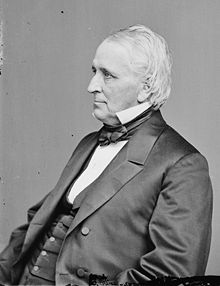Solomon Foot | |
|---|---|
 | |
| United States Senator from Vermont | |
| In office March 4, 1851 – March 28, 1866 | |
| Preceded by | Samuel S. Phelps |
| Succeeded by | George F. Edmunds |
| President pro tempore of the United States Senate | |
| In office February 16, 1861 – April 13, 1864 | |
| Preceded by | Benjamin Fitzpatrick |
| Succeeded by | Daniel Clark |
| Chairman of the Joint Congressional Committee on Public Buildings and Grounds | |
| In office 1861–1866 | |
| Preceded by | Jesse D. Bright |
| Succeeded by | B. Gratz Brown |
| Speaker of the Vermont House of Representatives | |
| In office 1847–1848 | |
| Preceded by | Ebenezer N. Briggs |
| Succeeded by | William C. Kittredge |
| Member of the United States House of Representatives from Vermont's 1st district | |
| In office March 4, 1843 – March 3, 1847 | |
| Preceded by | Hiland Hall |
| Succeeded by | William Henry |
| Speaker of the Vermont House of Representatives | |
| In office 1837–1839 | |
| Preceded by | Carlos Coolidge |
| Succeeded by | Carlos Coolidge |
| State's Attorney of Rutland County, Vermont | |
| In office 1836–1842 | |
| Preceded by | Reuben R. Thrall |
| Succeeded by | William C. Kittredge |
| Member of the Vermont House of Representatives from Rutland | |
| In office 1847–1849 | |
| Preceded by | Joel M. Mead |
| Succeeded by | Edwin L. Griswold |
| In office 1836–1839 | |
| Preceded by | Ambrose L. Brown |
| Succeeded by | George Tisdale Hodges |
| In office 1833–1834 | |
| Preceded by | Rodncy C. Royce |
| Succeeded by | Ambrose L. Brown |
| Personal details | |
| Born | November 19, 1802 Cornwall, Vermont, US |
| Died | March 28, 1866 (aged 63) Washington, D.C., US |
| Resting place | Evergreen Cemetery, Rutland, Vermont |
| Political party | Whig (before 1854) Republican (from 1854) |
| Spouse(s) | Emily Fay Foot Anna Dora Hodges Foot |
| Children | Helen Eliza Foot |
| Alma mater | Middlebury College |
| Profession | Teacher Lawyer |
| Signature | |
Solomon Foot (November 19, 1802 – March 28, 1866) was an American politician and attorney. He held numerous offices during his career, including Speaker of the Vermont House of Representatives, State's Attorney for Rutland County, member of the United States House of Representatives, and United States Senator.
A native of Cornwall, Vermont, Foot began working on local farms at age nine, helping support his family after the death of his father. After graduating from Middlebury College, Foot worked as a teacher, school principal, and college professor while studying law. After attaining admission to the bar in 1831, he opened a practice in Rutland.
Entering politics as a Whig, Foot served in several offices, including member of the Vermont House of Representatives, delegate to the state constitutional conventions of 1833 and 1836, and Rutland County State's Attorney. He was Vermont's Speaker of the House from 1837 to 1839. Foot served in the United States House of Representatives from 1843 to 1847 and was noted for his opposition to the Mexican–American War and the extension of slavery. He did not run for reelection in 1846; returned to the Vermont House, he served as Speaker from 1847 to 1848.
In 1850 Foot was elected to the United States Senate; he became a Republican when the party was founded, and won reelection in 1856 and 1862. Foot served as President pro tempore of the United States Senate during the American Civil War, and was a strong advocate for the Union. He headed the Joint Congressional Committee on Public Buildings and Grounds beginning in 1861, and which included supervising completion of the United States Capitol's construction.
Foot died in Washington, D.C., in 1866; he was buried at Evergreen Cemetery in Rutland.